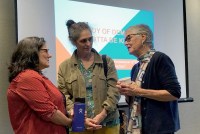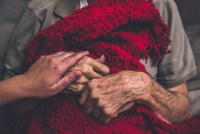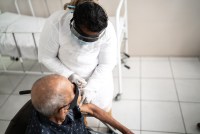Latest KFF Health News Stories
Damaged Credit Delays the Dream of Buying a Home
Joe Pitzo was diagnosed with brain cancer in 2018. After surgery, the bills topped $350,000. “This just took a major toll on my credit,” Joe said. “It went down to next to nothing.”
100 Million People in America Are Saddled With Health Care Debt
The U.S. health system now produces debt on a mass scale, a new investigation shows. Patients face gut-wrenching sacrifices.
She’s 31, Has Stage 4 Kidney Cancer — And Talked Openly About It in a Job Interview
Katie Coleman’s friends warned her not to tell prospective employers about her cancer diagnosis, fearing it would jeopardize her chances of being hired — even though it’s illegal for employers to discriminate because of a medical condition.
Long-Excluded Uterine Cancer Patients Are a Step Closer to 9/11 Benefits
More than 20 years after the terrorist attacks, the World Trade Center Health Program is considering covering the most common form of uterine cancer, in what patient advocates say is a key acknowledgment of the women affected by the 9/11 fallout.
The War on Cancer at 50: The Origin Story Begins With a Socialite Citizen-Lobbyist
After the National Cancer Act became law 50 years ago, cancer went from shameful taboo to one of the best-funded areas of medicine. Much of the credit for this transformation goes to one woman, Mary Lasker.
Oncology Doctors Say the Build Back Better Act Will Slash Cancer Care Funding — A Skewed Argument
The Community Oncology Alliance is targeting the prescription drug provisions of the Build Back Better Act, saying they will trigger deep cuts in oncologists’ pay, causing clinics to close and health care costs to rise. But it leaves out some important details.
It Takes a Team: A Doctor With Terminal Cancer Relies on a Close-Knit Group in Her Final Days
Dr. Susan Massad created a “health team” after learning she had metastatic breast cancer. These friends and family members help her make difficult decisions and lead the most fulfilling life possible.
Covid-Overwhelmed Hospitals Postpone Cancer Care and Other Treatment
Patients with advanced cancer and heart disease are among those who have had to have surgeries and other treatments delayed and rescheduled as a high number of critically ill, unvaccinated covid patients strain the medical system.
‘Luckiest Man Alive’: Why 9/11 First Responders’ Outlooks May Improve Even as Physical Health Fails
The New York City Fire Department’s 20-year report on the health consequences of the 9/11 terrorist attacks finds that first responders consistently report mental health quality-of-life indicators that are better than those of average Americans, even as their physical health declines.
‘Kicking You When You’re Down’: Many Cancer Patients Pay Dearly for Parking
Patients often fork over payments comparable to valet rates to park while receiving care. A recent study found that some of the country’s most prestigious cancer centers charge nearly $1,700 over the course of treatment for some types of the disease.
Getting a Prescription to Die Remains Tricky Even as Aid-in-Dying Bills Gain Momentum
Access to physician-assisted death is expanding across the U.S., but the procedure remains in Montana’s legal gray zone more than a decade after the state Supreme Court ruled physicians could use a dying patient’s consent as a defense.
Connecticut Is Doling Out Vaccines Based Strictly on Age. It’s Simpler, but Is it Fair?
On Monday, Connecticut will be the first state to begin vaccinating anyone from age 55 to 64 — instead of people with chronic health issues and essential workers.
Gene Screenings Hold Disease Clues, but Unexplained Anomalies Often Raise Fears
Multiple-gene panel tests are frequently offered to patients at risk for diseases such as cancer that can assess more than 80 genes. But in screening a wide variety of genes, doctors might see a variant that hasn’t yet been deciphered and be unable to explain its significance, leaving patients with concerns and no answers.
If I Have Cancer, Dementia or MS, Should I Get the Covid Vaccine?
Older patients with cancer, dementia or other serious illnesses should check with their doctors, but medical experts recommend the vaccine for most people.
Readers and Tweeters Defend Front-Line Nurses and Blind Us With Science
Kaiser Health News gives readers a chance to comment on a recent batch of stories.
New Legal Push Aims to Speed Magic Mushrooms to Dying Patients
A proposal in Washington state would use right-to-try laws to allow terminally ill patients access to psilocybin — the famed magic mushrooms of America’s psychedelic ’60s — to ease depression and anxiety.
Pruebas para el VPH y el cáncer cervical podrían hacerse en casa
El Instituto Nacional del Cáncer lanzará un estudio que involucrará a unas 5,000 mujeres para evaluar si la autoprueba casera puede equivaler a la que realiza el médico en un consultorio.
NIH Spearheads Study To Test At-Home Screening For HPV And Cervical Cancer
The National Cancer Institute plans to launch a multisite study next year involving roughly 5,000 women to assess whether self-sampling at home for the human papillomavirus that causes cervical cancer is comparable to screening in a doctor’s office.
Fearing The Deadly Combo Of COVID-19 And Cancer
Cancer patients seeking care during the coronavirus pandemic face an array of obstacles as states reopen, such as heavily restricted in-hospital appointments and new clinical trials on hold.
Pacientes de cáncer enfrentan retrasos en cirugías mientras COVID-19 paraliza hospitales
Son más vulnerables a la infección por el nuevo coronavirus. Y pueden estar enfrentando desafíos imprevistos para obtener atención, quimioterapia, e incluso cirugías para remover tumores.

























